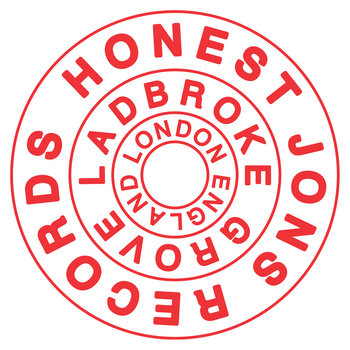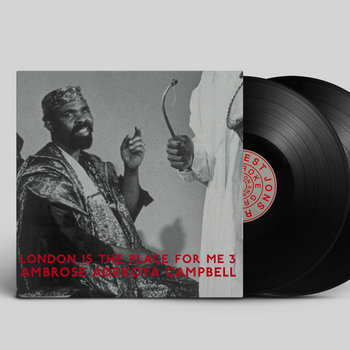
On a purely visceral level, Honest Jon’s compilation series London Is The Place For Me is both a fun and fascinating deep dive into one of the most fertile periods of British black music, both creatively and culturally. From the mid-1940’s to the end of the ‘50s, immigration to London from the British colonies in the West Indies and West Africa was at its peak—and the newcomers were bringing their music with them. The series reflects that; it’s full of the divergent but converging sounds of calypso, kwela, mento, jazz, and highlife that were played in the metropolis’ underground clubs. Every selection was recorded in London, and each one shines a light on a vital aspect of the capital’s soundtrack during a time that’s often overlooked by scene historians.



2 x Vinyl LP

But the series is so much more than that. The music on London Is The Place For Me establishes the cornerstones of intrinsically British black music: Absorbing black influences and ideas from around the world, running them through the feel of what’s going on around them in the capital, and emerging with something that could only have been made in Britain with its own British black audience in mind. (The same thing would happen with lovers of rock reggae, jungle, and grime in the years that followed.) Of course, this means the majority of its 120-plus tracks could never be described as pristine examples of their genre; and while that may infuriate purists, the whole point is that it’s black music of London, not black music in London. It’s a snapshot of young life in the capital, captured in recording studios, jazz dives, and dancehalls. It’s within the crucible of this music—and the creative environment that fostered it—that black British culture began to forge itself as its own distinct thing. With the breadth and depth of the series’ tracklisting, alongside its absorbing, beautifully illustrated booklets, a new generation of listeners can practically witness the genesis firsthand.
The narrative of British black music began some years before this collection’s earliest cuts, with the arrival of black American jazz band the Southern Syncopated Orchestra, in 1919. But it wasn’t until the 1930’s that the musicians in that scene began recording their work. By the time we get to the 1950’s—the decade covered by the first volume of London is the Place—the scene was booming. One of the reasons the series maintains such consistently high quality across eight volumes (and counting) is the wealth of material the compilers have to choose from. Shrewder record labels of the time were willing to invest in recording these acts because the audience for the music was huge. The buyers mostly fell into one of two categories: Newly-arrived immigrants who wanted a taste of home, and fans back home eager to hear London recordings from their favorite artists. The series even devotes two whole entries to a single artist: Volume 8 is dedicated to the Trinidadian Lord Kitchener and Volume 3 profiles the Nigerian guitarist and band leader Ambrose Adekoya Campbell. Singling out the biggest names in calypso and palm-wine highlife for standalone collections makes perfect sense; between them, Kitchener and Campbell do a good job of summing up this music as a metaphor for Commonwealth immigration and integration.
In fact, the series’ title was chosen after Kitchener’s best-known song of the same name—a jubilant tune he first sang while descending the gangplank of the SS Empire Windrush upon his arrival in the UK in 1948, and a moment immortalized in a filmed news report about the ship, marking the first big wave of West Indian immigration. Three years earlier, Campbell’s band, the West African Rhythm Brothers, made national news when they led an impromptu parade—with drums and guitars—around London’s Trafalgar Square, as huge crowds celebrated the end of World War II.

2 x Vinyl LP

The two dozen tracks from Kitchener on Volume 8 evidence how calypso managed to solidify its place as a mainstream pop genre of the day and why Kitchener was its star. The arrangements take on the popular rhythms of the time, like swing, rumba, and cha cha, without losing their Trinidadian calypso essence. This meant guaranteed dancehall acceptability, and the perfect platform for Kitch to spin inventive—and frequently hilarious—tales of life in the UK, with topics spanning taxi fare increases, the Manchester football clubs, Carnival celebrations, the need for black solidarity, and his girlfriend who won’t cook West Indian food.
Campbell’s playlist is less broadly appealing, but just as interesting. Quickly absorbed into the Soho jazz world, Campbell hung out with the likes of Ronnie Scott and Phil Seamen, both of whom have acknowledged the ways that Campbell expanded their musical horizons. The bandleader studied guitar under Trinidadian master Lauderic Caton; adopted the Barbadian Harry Beckett and Willy Roachford into his all-Nigerian band; and was close friends with the London-loving, Jamaican ska legend Prince Buster. Naturally, these associations influenced the supremely laid-back juju/palm-wine music that was Campbell’s stock-in-trade—witness the ska-like “Iku Koni Payin,” or the calypso-ish “Ayami”—although he never submerged the percussion and guitars enough to let anyone forget that they were listening to Nigerian music.

2 x Vinyl LP

These two approaches epitomize the pan-Commonwealth revolution in London’s black music. Like Kitch, most players weren’t afraid to adapt to their environment—which, incidentally, greatly boosted the export market, as back-home audiences loved the variations; and Campbell’s organic process of rubbing shoulders with musicians from around the world in studios and in clubs meant a constant exchange of ideas and influences. The late jazz pianist and steel pan player Russ Henderson—who contributed music and photographs to this series—described it to me thus: “It was like a big melting pot in there, this was very good. We musicians would meet in the bands in the clubs, and would take each other to recording gigs we knew about—we didn’t care where we was actually from, because we were all of us black in London. We all brought bits of our own musical backgrounds to the studio and it gave the music a feel it didn’t get anywhere else. It was good for us as people too, because it brought us all together.”
This is what gives London Is The Place For Me its cultural edge. By the time that the series’ story begins, those styles were already beginning to bleed into each other, creating a fascinatingly London vibe. A big clue to the way the series approached its task lies in the titles of each volume. Volumes Two, Five, and Six carry the addendum “… From Young Black London,” in front of such genre descriptions as kwela, highlife, mento, jazz, Latin, and calypso. Volume Four acknowledges the West End club scene in its title “African Dreams And Piccadilly Highlife.” Even the first chapter differentiates itself from original calypso with the subtitle, “Trinidadian Calypso In London.” While the music on that first installment may be relatively conventional, it plays like a 20-track letter to home, reporting on what life in the capital is really like: getting lost on the subway, nosey landladies, cricketing triumphs, and no carnival. Volume Seven doesn’t have a subtitle, but there’s no shortage of London-centric subject matter: road safety, the subway (something of a recurring theme…), overeating in Clapham, and so on. But it expands its musical range to include Joropo, while featuring such gems as a Louise “Miss Lou” Bennett track and a rare recording of an early steel band in London.

2 x Vinyl LP

The quality on offer—and the care with which it has been put together—is so high that it’s almost counterproductive to try to cherry-pick tracks and artists. The best way to approach London Is The Place For Me is as an overall experience: a palm-wine-ish take on the lounge classic “Sway,” the Caribbean mambo of “Calypso Rhythm Dance,” Cuban-style highlife, a hit called “Bebop Calypso” that is exactly what it says it is, Gospel swing with a distinctly Caribbean flavor. The surprises are a big part of the enjoyment.
Lloyd Bradley is the author of Sounds Like London: 100 Years of Black Music in the Capital.







